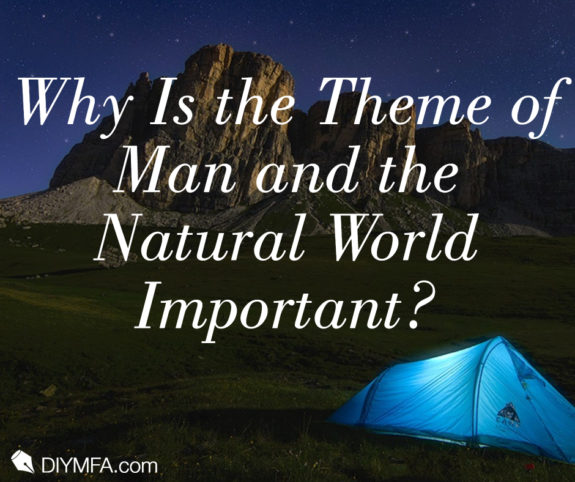How often do you come across nature? Even if you live in an urban area, the answer is probably, “Every day.” You see, nature isn’t limited to trees, animals, and bodies of water. It also includes the seasons, precipitation, extreme weather events, and seismic activity. As a result, the natural world can impact every aspect of our lives, from our commutes to and from work and our weekend plans, to our ability to breathe and the soundness of our homes. And of course, we can’t ignore the impact that we humans have left on nature.
If you think about it, our relationship with the natural world is as ripe with conflict as the relationship between two characters. Maybe that’s why so many writers have explored it as a literary theme in their work. But why exactly is this theme important? Let’s explore five of those reasons in today’s edition of Theme: A Story’s Soul.
1) The Natural World is One of the Reasons Why We’re Alive
Nature isn’t simply part of the world we live in. It provides us with food, water for drinking and bathing, and air we can breathe. It nurtures our crops and gardens with rain and sun, offers shade on hot days, and abounds with herbs and botanicals that have medicinal properties. Essentially, the natural world enables us to survive.
Books such as Ernest Hemingway’s The Old Man and the Sea, Scott O’Dell’s Island of the Blue Dolphins, and C.S. Lewis’s The Lion, the Witch, and the Wardrobe remind us to accept and be grateful for the sustenance and protection that nature offers us. Calling this theme “man versus nature” would be unfair and inaccurate for this reason and others we’ll discuss shortly. The point is, since we live in and are alive because of nature, it’s important for us to appreciate nature for all its beauty, nourishment, and lifesaving relief.
2) It Compels Us to Reflect on Our Relationship with Living Things
If you’ve read The Lion, the Witch, and the Wardrobe or watched its film or TV adaptations, you might remember that several of its characters – Aslan the lion, the Beavers, even Mr. Tumnus the Faun – are animals or mythological creatures with animal-like features. Now, what other stories have you read where animals are part of the cast of characters? I can think of Yann Martel’s Life of Pi, Stacey O’Brien’s Wesley the Owl, Anna Sewell’s Black Beauty – and that’s just for starters.
Indeed, our relationships with other living things are highlighted in stories where man and the natural world is a central theme. With animals in particular, we often see them portrayed as characters with human-like traits and qualities that we can relate to or see in ourselves. Sometimes, these characters are treated with love and respect. Other times, they’re neglected or mistreated in violent and heartbreaking ways. Both approaches underscore how humans and animals (and the natural world at large) depend on one another, for better or worse, in order to survive—and, more importantly, how the love between us and an animal can be one of the most nurturing and life-changing bonds we’ll ever have.
3) It Teaches Us to Reconnect with Ourselves on a Spiritual Level
Why else would Mary Oliver have compared death to “the hungry bear in autumn” in her poem “When Death Comes”? Or Robert Frost have used the famous “[t]wo roads diverged in a yellow wood” to symbolize choice in “The Road Not Taken”? Whether we realize it or not, our connection with the natural world goes deeper than survival. In fact, it takes us to the deepest parts of ourselves that find joy or solace in the calm that nature offers.
Hermann Hesse’s Siddhartha is an excellent example of the spiritual side of this theme. As Siddhartha embarks on his quest for enlightenment, he experiences both the beauty and brutality of the natural world, and his feelings toward it seesaw between scorn and admiration until he learns to see nature as a source of healing and reconnecting with himself. He also meets Vasudeva, a ferryman who views the river he paddles across as a source of contemplation and mysticism. Thus, stories like Siddhartha that delve into this theme help us remember our place in the natural order of the planet. If fictional characters can remember who they are by spending time in the stillness of nature, so can we.
4) It Demonstrates the Power that Nature Holds Over Us
Of course, nature isn’t always calm and quiet. We see this in N.K. Jemisin’s Broken Earth trilogy, where select people have the power to control the earth’s energy and prevent earthquakes, tsunamis, and volcanic eruptions—or cause them. We also see this in Rae Carson’s Walk on Earth a Stranger, where young Lee must endure drought, extreme heat, buffalo stampedes, and the Rocky Mountains before she can join the California gold rush. And let’s not forget how the crew of the fishing boat Andrea Gail was lost at sea during a massive nor’easter in Sebastian Junger’s The Perfect Storm.
In other words, we (and living things in general) are often as nature’s mercy. The challenges that the natural world can present through its weather, landscapes, and geological phenomena can threaten our ability to travel, our means of electricity, our homes, and even our survival. So when a story demonstrates how nature can be an obstacle to a character’s goal—or, in some instances, can serve as part of the main conflict—it illuminates how nature can be violent, unpredictable, and deadly. And when it is, we should respect its power just as we respect its gifts.
5) It Reminds Us to Take Better Care of the Natural World
It’s true that mankind’s impact on the natural world is one of many hot-button political issues right now. But it’s equally true that, just as nature affects our lives, we affect nature in return—and usually not to nature’s benefit. Look long enough, and you’ll also find plenty of stories that show characters tipping that balance in their favor and the natural world suffering as a result.
Take Jay Kristoff’s Stormdancer, for example. After an industrial revolution, the story’s fictional setting has become so polluted that its people are sick or dying, and so much of the land has been deforested that many plant and animal species—including the arashitora, one of the country’s mythical creatures—have become or are believed to be extinct. The planet Athshe in Ursula K. Le Guin’s The Word for World is Forest faces a similar crisis. Colonists from Earth enslave the Athsheans and begin clearing the mostly forested land for timber, which has become scarce on Earth. In each story, the destruction of its setting plays a major role in the plot and compels the characters to interact with nature—and to consider the beauty of what’s been lost and how to save what’s left. So when we read about this take on the theme of man and the natural world, we can’t help but think about our own planet’s environmental issues and how we can take better care of the place we all call home.
In your opinion, why is man and the natural world an important theme? What other reasons would you add to this list? Which stories have you read that are compelling examples of this theme?

Sara Letourneau is a freelance editor and writing coach based in Massachusetts. She’s currently taking clients with manuscripts in speculative fiction, literary fiction, or YA, though she’s open to other genres as well. She’s also a poet whose work has appeared in Amethyst Review, Canary, Muddy River Poetry Review, Soul-Lit, and elsewhere. A Massachusetts resident, she can often be found performing her poems at local open mic nights, reading good books, and enjoying a cup of tea. Learn more about how Sara can help you with your writing at Heart of the Story Editorial & Coaching Services. You can also connect with her at her writer website, Twitter, Goodreads, or Instagram.







